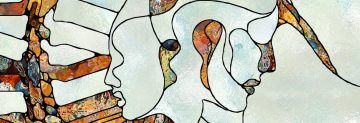Peter Sjöstedt-H in iai:
 “[W]hat we experience in our dreams … is as much a part of the overall economy of our soul as anything we ‘really’ experience.”
“[W]hat we experience in our dreams … is as much a part of the overall economy of our soul as anything we ‘really’ experience.”
– Nietzsche, Beyond Good and Evil
Such is it with dreams; even more so with psychedelics. But psychedelic experience not only enriches the self, it can contribute to our understanding of what the self is or can be. Psychedelic intake can violently alter aspects of the prosaic, or ordinary self; moreover it can add multiple further facets. In fact, it can in extremis destroy or multiply the “self” – with a range from individuality through unity to infinity, as we shall see.
First let us look at what can be meant by this ambiguous term, “the self”, in its ordinary sense. The self can be understood in its relation to matter, and in its relation to mind. In relation to matter, the self can be understood as, i. reducible to part of the body (materialism), ii. a soul distinct from the material body (dualism), iii. a mind that creates what appears as matter (idealism), and iv. the self can be understood as being at one with an extended body (processism). The common view is undoubtedly i. and ii., the biological and the predominantly religious – though both are fundamentally faith positions. As anthropologist, cyberneticist Gregory Bateson lamented:
“These two species of superstition … the supernatural and the mechanical, feed each other. In our day, the premise of external mind seems to invite charlatanism, promoting in turn a retreat back into a materialism which then becomes intolerably narrow.”
Whatever the mind-matter view, all will still understand by “self” its phenomenal aspects as well – the self in relation to mind. Certain thinkers, following Hume’s suggestion, consider the “self” to be an illusion of the mind in the sense that the word does not refer to any particular thing underlying the bundle of types of experience listed below. Such a belief claims that we cannot directly perceive the “self” as such, but only phenomena such as colour, sound, emotion, etc. Kant in response argues that though we cannot directly perceive the pure, underlying self, we must nonetheless assume it to exist (as “pure apperception”) as that which holds all such experiences together as one – a bundle is a unity that, as such, must be tied.
More here.
